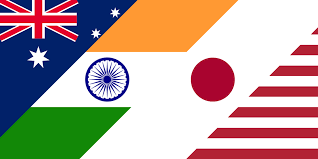India, the QUAD, Russia and China
Is India reliable?
As recently discussed in an earlier article, unity around common values with allies and partners is a critical piece of US national security and a key element of our National Security Strategy. In the vein of unifying with partners and allies in order to create a safer and more equitable world, India potentially plays a significant role. Despite technically being the world’s largest democracy at something like 1.4 billion people, India’s strategic relationships are far more complicated. As those relationships affect US national security, the jury is still out on her reliability, despite being one of the 4 key players in the QUAD. The QUAD, the US, Australia, Japan and India, play an important role in the Indo-Pacific as a hedge to Chinese aggression.
Of the four member nations, only India shares a border with China, and it has been contentious for centuries. It is in fact China, even more than Russia that has dominated national security focus for the past few years due to Xi’s, pursuit of achieving regional dominance by 2035 and global dominance by 2049. Xi’s primary tool in achieving his goals is the BRI, Belt and Road Initiative which is a tangled web of transportation, communication and commercial corridors that span the globe and is a similar concept to the famous Silk Road of Marco Polo fame. It is a massive undertaking and one which gives Xi leverage over all nations that sign up to be a part of it. India, is his one significant regional hurdle and for that reason, has value to the US and the rest of the rules-based, international order. No one is trying to stop China but rather modify her behaviour so that the BRI becomes an equitable form of commerce for all nations instead of creating nations subservient to Xi’s whims and wishes.
This brings us back to why we have concerns over India’s reliability as a strategic partner. India has long had a strong relationship with both Russia and her predecessor, the Soviet Union. Much of her fossil fuels required for her emerging economy and 60% of her weapon systems come from Russia. She collaborates with Russia on wheat prices as that they are both leading wheat producers. In a world where there is always a shortage of food and fuel to drive economies, especially emerging economies, this gives both Russia and India outsized control over critical issues.
India has only once, since “Putin’s War” began, meekly condemned the near genocidal behavior of Putin’s troops in Ukraine. She also speculates on wheat commodities which are already short because of the war and causing hunger throughout the 3rd world. Even worse is that Modi’s India is also helping Putin evade sanctions in a variety of ways, therefore exacerbating and extending the agony of the Ukrainian people. Technically, India considers herself a “non-aligned” nation, though her actual behavior is more in line with being aligned with Putin. With a resurgent China demonstrating aggression around the world, the US and our allies require a reliable Indian partner that demonstrates a commitment to universal human values instead of Putin’s complete lack of values.
For the time being, Washington is trying our best to be patient with Delhi, but that patience will not last forever. To be clear, India needs the other members of the QUAD, more than we need India, but not by a whole lot. Modi, India’s populist Prime Minister is playing as close as he can to the line between US patience and US rejection. The new administration in DC will not give him the latitude that the Trump White House did. Modi, like Trump and a few other leaders were all members of a class of populist leaders in a global wave of populism, unseen since the runup to the second World War. My opinion is that this wave has reached its peak and is very slowly ebbing globally. Maybe Modi hasn’t gotten the memo yet.
Country to country relationships, are just like personal relationships, nuanced and require a lot of work. In this case, Modi is ignoring the work and just collecting whatever he can from all players. The US, like our other allies must now decide if they are willing to accept Modi’s lack of interest and investment in relationships with his QUAD partners. If we opt not to, it will hurt for a while but we, Japan and Australia will succeed without him. It will just be harder. India’s future, tied to a despotic Russia is a poor long-term choice for Modi. I wonder if he realizes just how poor?
Linked below is an excellent 30-page backgrounder, from the CRS, Congressional Research Service. It is considered one of the best, non-partisan sources available.


